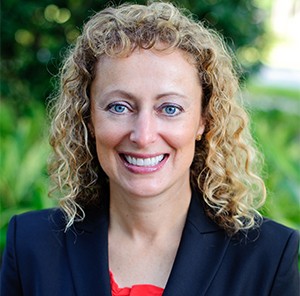Meet Director Svetlana Shtrom, Ph.D.
Svetlana Shtrom, Ph.D. is the Director of the Office of Technology Transfer (OTT). She joined the office in 2007 and has over 16 years of experience in business development and technology management. Svetlana holds an MBA from UCF, was a postdoctoral fellow at the National Institutes of Health (NIH), and received a Ph.D. in Cell Biology from the University of California at San Francisco and a B.S. in Molecular Genetics from the Ohio State University. Svetlana serves on the Board of Directors and is the Chair of the Professional Development Committee of BioFlorida.
Prior to joining UCF, she consulted for biotechnology companies and venture capital firms in business growth and technology evaluation. She also managed business development at several emerging biotechnology companies focused on development and manufacture of clinical diagnostics. Before working in biotechnology industry, she was a Technology Transfer Specialist at the National Cancer Institute (NCI) where she facilitating partnerships with industry, academia, and non-profit organizations.
What is your typical day like?
The majority of my daily activities are focused on intellectual property (IP) management, technology commercialization, and economic development. I meet with faculty and student researchers to discuss their discoveries and the optimal strategies for protecting the IP and identifying partnership opportunities to develop these discoveries into products. I also meet with entrepreneurs, investors, and business professionals to introduce them to our innovative technologies and to our researchers to facilitate research collaborations and commercialization partnerships.
What is the vision that you have for OTT?
The OTT is a key component of the UCF innovation infrastructure. We are here to serve the researchers and to facilitate partnerships with entrepreneurs, investors, and companies to move university discoveries into the marketplace. For the past several years, we have focused on optimizing our processes and enhancing our outreach activities, resulting in higher number of deals executed and startup companies formed. Our reputation for exceptional service and successful deal flow is growing. I would like to see the OTT continue to reach new highs and be viewed by all of our clients, internal and external to the university, as an indispensable partner in innovation.
What is OTT’s mission?
Our mission is to cultivate and support world-class research, commercialization, and economic growth. We support this mission by fostering the creation and commercial development of intellectual capital that can solve today’s pressing problems, improve the quality of life for the world, and provide an engine for economic growth for Central Florida and the nation.
What are OTT’s FY2016 goals?
Our goals are to increase the number of commercialization deals we execute and to increase the number of sustainable companies we launch.
What is most challenging about licensing university IP?
The most challenging aspect of our job is securing rewarding partnerships to develop university discoveries into commercial products. As typical for most universities, inventions arising from basic research tend to be at an early-stage; however, industry partners usually seek proven technologies to bring into their company’s pipeline. We work closely with our faculty researchers to assist them in securing additional resources and funding to further test and develop their discoveries to generate proof-of-principle data and to build prototypes. We often partner with entrepreneurs, investors, and the industry in multiple dimensions, including collaborations, sponsored research, and licensing rights. We approach every relationship with openness and flexibility to create a meaningful partnership that is poised for success.
What makes you the most proud about the licensing process here at UCF?
In FY2015, we partnered with 30 companies/investors/entrepreneurs in licensing our technologies. Of these 30 partners, 14 were new startup companies. With all of the licensing challenges I described, we still manage to secure a significant number of partnerships with almost half of these partnerships resulting in creation of new companies. I am very proud of the dedicated team of professionals in our Technology Transfer group and their commitment not only to seek out and close deals, but to continue to support and nurture these partnerships.
Who is your ideal licensee?
An ideal licensee is passionate about building a business around the university technology he/she is seeking to license and is prepared to dedicate time, effort, and resources into building this business. Also, it is, of course, much easier to negotiate a deal with a partner who is experienced in licensing intellectual property from an academic institution. These licensees understand that the technology they are licensing is at an early stage, and they are prepared to seek out and secure additional resources to develop the technology into a successful product line.
Overall, what are the ingredients of success for a licensor/licensee relationship?
I think that for a relationship to succeed there needs to be trust, openness, and flexibility on both sides. Many different inputs, considerations, and constraints influence negotiation of a contract. We view a signed contract not as an end result, but as a new beginning to a meaningful partnership. We approach every deal with a long-term view and offer as much flexibility as possible to set up our partner for success. Some legal elements of a contract are absolutely required, and we are honest and clear with our prospective partner as to the rationale for the requested terms, so that we are much more likely to reach a compromise. Our goal is to end a negotiation so that both sides feel optimistic about the new partnership and are committed to maintaining the positive relationship.
If you’re interested in disclosing your UCF invention or licensing UCF technology, contact Svetlana Shtrom to get the conversation started.
